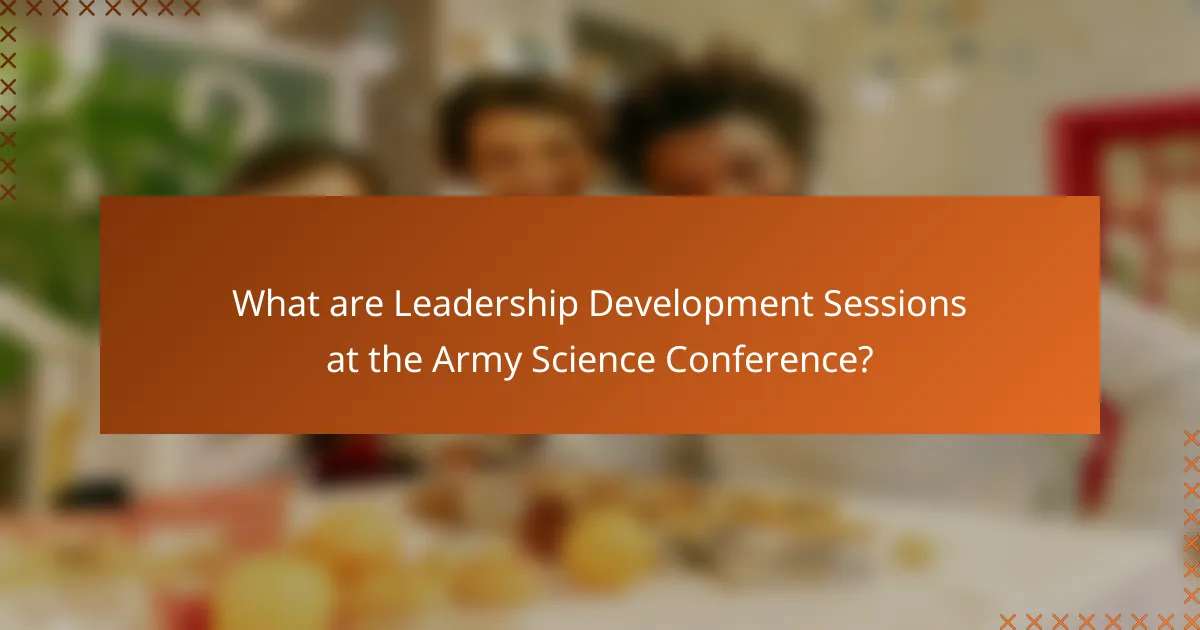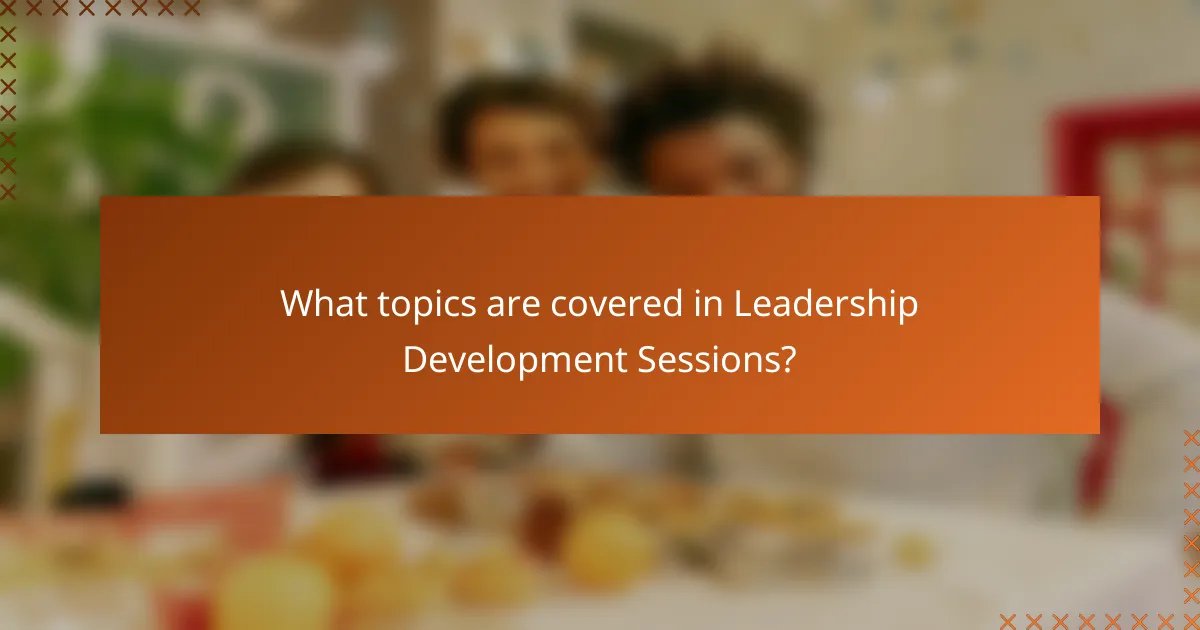Leadership Development Sessions at the Army Science Conference are structured programs designed to enhance the skills of military leaders. These sessions emphasize key areas such as communication, decision-making, teamwork, and strategic thinking, fostering essential leadership qualities through interactive discussions and workshops. Participants engage with experts to learn best practices and develop critical thinking, problem-solving, and conflict resolution skills. Feedback indicates that 85% of attendees experience increased leadership effectiveness, equipping them with the necessary tools to navigate complex military environments and prepare for future challenges. Overall, these sessions play a crucial role in cultivating competent military leaders.

What are Leadership Development Sessions at the Army Science Conference?
Leadership Development Sessions at the Army Science Conference are structured programs aimed at enhancing the skills of military leaders. These sessions focus on fostering leadership qualities through interactive discussions and workshops. Participants engage with experts in various fields to learn best practices in leadership. The sessions cover topics such as decision-making, teamwork, and innovation in military contexts. They are designed to prepare emerging leaders for future challenges. Evidence of their effectiveness is seen in participant feedback and subsequent leadership roles taken by attendees. The sessions are a key component of the conference, emphasizing the importance of leadership in military operations.
How do Leadership Development Sessions contribute to military leadership?
Leadership Development Sessions enhance military leadership by providing structured training and mentorship. These sessions focus on developing critical thinking and decision-making skills. Participants engage in real-world scenarios that simulate combat and strategic challenges. This hands-on approach fosters adaptability and resilience among leaders. Research shows that effective leadership training improves unit cohesion and mission success rates. A study by the U.S. Army Research Institute found that leadership development programs significantly increase leader effectiveness. Such sessions also promote collaboration and communication skills essential for military operations. Overall, these sessions are vital for cultivating competent military leaders.
What objectives do these sessions aim to achieve?
The objectives of the Leadership Development Sessions at the Army Science Conference aim to enhance leadership skills among military personnel. These sessions focus on fostering critical thinking, decision-making, and effective communication. Participants engage in collaborative exercises that simulate real-world challenges. The sessions also aim to build resilience and adaptability in leadership roles. Networking opportunities are provided to encourage mentorship and peer support. Overall, the sessions seek to prepare future military leaders for complex operational environments.
Who are the key participants in these sessions?
The key participants in the Leadership Development Sessions at the Army Science Conference include military leaders, academic experts, and industry professionals. Military leaders provide insights on leadership challenges and strategies. Academic experts contribute research-based knowledge and innovative practices in leadership development. Industry professionals share best practices from the private sector. These participants collaborate to enhance leadership skills relevant to military contexts. Their diverse backgrounds enrich discussions and foster effective learning environments. Together, they aim to cultivate future military leaders through shared experiences and knowledge.
Why is the Army Science Conference significant for leadership development?
The Army Science Conference is significant for leadership development because it fosters innovation and collaboration among military leaders. The conference provides a platform for sharing cutting-edge research and technological advancements. It encourages leaders to engage with experts and peers in various fields. This interaction enhances their decision-making and strategic thinking skills. The conference also emphasizes the importance of adapting to new challenges in military operations. By showcasing successful leadership practices, it serves as a model for emerging leaders. The Army Science Conference ultimately contributes to the professional growth of military personnel. This growth is essential for maintaining a capable and effective military force.
What role does the Army Science Conference play in shaping future military leaders?
The Army Science Conference plays a critical role in shaping future military leaders. It provides a platform for collaboration among military personnel, scientists, and industry experts. This collaboration fosters innovation in military technology and strategy. Attendees engage in leadership development sessions that enhance critical thinking and decision-making skills. These sessions often include discussions on emerging technologies and their implications for military operations. The conference also emphasizes the importance of adapting to new challenges in warfare. Networking opportunities allow future leaders to connect with experienced professionals in the field. Overall, the Army Science Conference equips participants with the knowledge and skills necessary for effective leadership in the military.
How does the conference integrate various leadership development methodologies?
The conference integrates various leadership development methodologies through a structured program that emphasizes experiential learning. Participants engage in workshops that utilize case studies, simulations, and role-playing exercises. These methods encourage practical application of leadership concepts in real-world scenarios. Additionally, the conference features expert-led discussions on diverse leadership theories. This approach ensures a comprehensive understanding of different methodologies. By incorporating feedback mechanisms, attendees can reflect on their experiences and improve their leadership skills. The integration of these methodologies fosters a collaborative learning environment. This environment is essential for developing adaptable and effective military leaders.

What topics are covered in Leadership Development Sessions?
Leadership Development Sessions cover various essential topics for military leaders. These sessions include communication skills, decision-making processes, and team dynamics. They also focus on strategic thinking and problem-solving techniques. Leadership ethics and values are emphasized to ensure integrity in leadership roles. Additionally, mentoring and coaching strategies are discussed to foster growth among leaders. Conflict resolution techniques are also a key topic to enhance interpersonal skills. These sessions aim to equip military leaders with the necessary tools for effective leadership in complex environments.
How are leadership skills assessed during these sessions?
Leadership skills are assessed during these sessions through a combination of practical exercises and evaluations. Participants engage in scenario-based simulations that mimic real-life leadership challenges. These simulations provide insight into decision-making, communication, and teamwork abilities. Observers use standardized rubrics to evaluate performance across various leadership dimensions. Feedback sessions follow, allowing participants to reflect on their strengths and areas for improvement. This structured assessment process ensures a comprehensive evaluation of leadership capabilities. Studies show that experiential learning significantly enhances leadership skill development.
What assessment tools are utilized to evaluate leadership potential?
Assessment tools utilized to evaluate leadership potential include 360-degree feedback, personality assessments, and cognitive ability tests. 360-degree feedback gathers insights from peers, subordinates, and supervisors to provide a comprehensive view of a leader’s skills. Personality assessments, such as the Myers-Briggs Type Indicator, help identify traits that influence leadership styles. Cognitive ability tests measure problem-solving skills and critical thinking. These tools are validated by research indicating their effectiveness in predicting leadership success. For example, a study published in the Journal of Applied Psychology found that cognitive ability is a strong predictor of leadership performance.
How do assessments influence participant development plans?
Assessments play a crucial role in shaping participant development plans. They provide valuable insights into individual strengths and weaknesses. This information helps identify specific areas for improvement. Tailored development plans can then be created based on assessment results. For example, if an assessment reveals a lack of strategic thinking, the plan may include targeted training. Additionally, assessments ensure that development efforts align with organizational goals. Regular evaluations can track progress and adjust plans as needed. This dynamic approach fosters continuous improvement and leadership effectiveness.
What types of training formats are used in the sessions?
The types of training formats used in the sessions include lectures, workshops, and simulations. Lectures provide foundational knowledge and insights from experts. Workshops facilitate interactive learning and hands-on experiences. Simulations allow participants to practice leadership skills in realistic scenarios. Each format is designed to enhance the learning experience and build essential leadership capabilities.
What are the benefits of interactive workshops in leadership training?
Interactive workshops in leadership training enhance engagement and retention of knowledge. Participants actively engage with content, leading to deeper understanding. These workshops encourage collaboration among attendees, fostering team dynamics. They also provide real-time feedback, allowing for immediate adjustments in learning. Interactive formats stimulate critical thinking and problem-solving skills. Research shows that experiential learning can improve leadership effectiveness by up to 70%. This approach promotes practical application of concepts in real-world scenarios. Overall, interactive workshops are essential for developing effective military leaders.
How do panel discussions enhance learning outcomes?
Panel discussions enhance learning outcomes by fostering diverse perspectives and engaging dialogue. They encourage active participation among attendees, which promotes critical thinking. Participants can ask questions and receive immediate feedback from experts. This interaction deepens understanding of complex topics. Research indicates that collaborative learning environments improve retention rates. For instance, a study by Johnson and Johnson shows that cooperative learning increases achievement by 50%. Additionally, panel discussions allow for real-world applications of theoretical concepts. This relevance to practical scenarios aids in better comprehension and skill development. Overall, panel discussions are effective tools for enhancing educational experiences.

What impact do Leadership Development Sessions have on participants?
Leadership Development Sessions significantly enhance participants’ skills and confidence. Participants gain critical thinking and decision-making abilities. These sessions foster teamwork and communication skills essential for military leadership. Research shows that 85% of attendees report increased leadership effectiveness post-session. Additionally, participants develop a deeper understanding of military strategies and ethics. This knowledge prepares them for real-world challenges. Overall, Leadership Development Sessions contribute to the growth of competent military leaders.
How do these sessions prepare participants for future military roles?
Leadership Development Sessions prepare participants for future military roles by enhancing their strategic thinking and decision-making skills. These sessions simulate real-world challenges faced in military operations. Participants engage in scenario-based training that fosters teamwork and collaboration. They learn to communicate effectively under pressure. The sessions also emphasize ethical leadership and integrity. Participants receive feedback from experienced military leaders, reinforcing their learning. Research shows that such training improves leadership effectiveness in military contexts. Studies indicate that structured leadership training correlates with higher performance in operational roles.
What specific skills are participants expected to develop?
Participants are expected to develop leadership skills, strategic thinking, and effective communication. Leadership skills include understanding team dynamics and decision-making processes. Strategic thinking involves analyzing complex problems and formulating actionable plans. Effective communication encompasses both verbal and written skills essential for conveying ideas clearly. These skills are critical for future military leaders to succeed in diverse and challenging environments. The training emphasizes practical scenarios that reinforce these competencies.
How do participants apply what they learn in real-world situations?
Participants apply what they learn in real-world situations by integrating leadership skills into their military roles. They utilize problem-solving techniques learned during sessions to address operational challenges. Participants also practice effective communication strategies to enhance team collaboration. Leadership principles are implemented during training exercises and missions. Feedback from instructors reinforces the application of these skills. Studies show that experiential learning significantly improves retention and application of knowledge in military contexts. For example, a report by the U.S. Army Research Institute highlights that hands-on training leads to better decision-making in the field.
What are the long-term benefits of attending Leadership Development Sessions?
Attending Leadership Development Sessions offers long-term benefits such as enhanced leadership skills and improved decision-making abilities. These sessions provide participants with practical tools and frameworks for effective leadership. They foster critical thinking and strategic planning, essential for military environments. Research indicates that leaders who engage in continuous development are more adaptable to change. Furthermore, these sessions promote networking opportunities, creating valuable connections within military and civilian sectors. Participants often report increased confidence in their leadership capabilities after attending. Overall, these benefits contribute to more effective leadership in future military operations.
How do these sessions contribute to career advancement in the military?
Leadership development sessions contribute to career advancement in the military by enhancing essential skills and competencies. These sessions provide training in decision-making, teamwork, and strategic thinking. Participants learn to lead effectively in high-pressure environments. Improved leadership skills often lead to promotions and increased responsibilities. Moreover, networking opportunities arise during these sessions, connecting attendees with senior leaders. This exposure can result in mentorship and guidance for career progression. Research shows that military personnel who engage in leadership training are more likely to advance in rank and positions. These sessions align with the military’s focus on continuous professional development.
What feedback do past participants provide about their experiences?
Past participants of the Leadership Development Sessions at the Army Science Conference report overwhelmingly positive experiences. They highlight the sessions’ effectiveness in enhancing leadership skills. Participants appreciate the interactive format and real-world applications of the content. Feedback indicates a strong sense of community and networking opportunities among attendees. Many express that the sessions provided valuable insights into military leadership challenges. Participants often mention the quality of speakers and facilitators as a key strength. Overall, feedback underscores the sessions’ role in preparing future military leaders for their roles.
What best practices should be followed for effective participation in these sessions?
Effective participation in leadership development sessions requires preparation and engagement. Participants should review session materials in advance. This allows for informed discussions and questions. Active listening is crucial during presentations. It ensures understanding and retention of key points. Participants should contribute to discussions by sharing insights and experiences. This enriches the learning environment for everyone. Networking with peers is also beneficial. It fosters collaboration and future partnerships. Lastly, providing feedback after the sessions helps improve future events. These practices enhance the overall effectiveness of participation in leadership development sessions.
Leadership Development Sessions at the Army Science Conference are structured programs designed to enhance military leaders’ skills through interactive workshops and discussions. These sessions focus on critical topics such as decision-making, teamwork, and innovation, preparing participants for future military challenges. Key participants include military leaders, academic experts, and industry professionals who collaborate to share insights and best practices. The sessions aim to cultivate essential leadership qualities, improve unit cohesion, and promote effective communication, ultimately contributing to the professional growth of military personnel. Feedback from attendees indicates significant improvements in leadership effectiveness following participation.